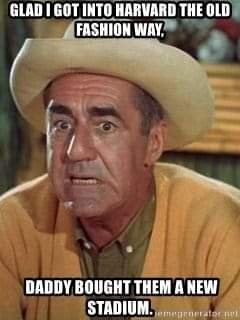As an Ivy League graduate, and also as someone who volunteered as an applicant interviewer (most of the Ivy League colleges have interviews by alumni as part of the application procedure) for close to 30 years, this scandal is sad but not too much of a surprise.
Admission to these schools is much more competitive than 40-50 years ago. When I applied, the acceptance rate at my school was just below 10% - they probably got about 12000 -14000 applications. Now the acceptance rate is in the 4-6 percent range. The number of applications has close to quadrupled while the number of slots has barely risen.
In terms of merit, I would say a lot of applicants would be successful at my alma mater. I interview over 100 students over those years. There were maybe 3 that I thought "no way". Otherwise almost all were in the top 10% of their school and perhaps a 3rd in the top 2 or 3 percent academically.
The school asks you to evaluate them no so much on their academic work but on other "criteria" - what are their interests, what type of personality do they exhibit, what type of "leadership" qualities can one discern (i.e., captain of a varsity team or created and managed a student club, vs being just a member). Essentially we report the "human" side of the student back. Generally speaking, the school leans towards those who want to come not just to study but to get involved in various extracurricular activities at the school and in the community.
Of course, what we write and rank is only one criteria. I probably ranked 20-30 applicants as "outstanding" and really wanted to see admitted. about 5 of them were admitted. another 2 I had not rated as highly, but they were admitted.
The name does make a difference. When my high school counselor first recommended I apply to Ivy League schools, my reaction was "I'll never get in, that school is just for rich white people". It took him a week to convince me that my academics and activities made me a competitive applicant. I applied to three and was accepted at 2 of them. Interestingly, the one that I thought I would get into, the one that seemed to express the most interest in me, was the one I was rejected from.
While I was a student, I saw very few people drop out of the school because they could not handle the academics. Frankly, the difficulty of getting in carries enough clout that as long as you pass and get enough credits to get your degree, what your grades were are not considered as much as they would be from other schools. Most dropped out because they chose to ignore the academics, or could not deal with the social situations, or violated one of the academic rules (like plagiarism or the test honor system) that usually meant an automatic expulsion/suspension. Those who were like me, minorities and/or first generation college students from their families and/or coming from underprivileged backgrounds were so worried about flunking out that maybe we spent too much time at the library, labs, and computer centers.
The name made a difference then, and it still does. Megacorp was specifically targeting my school for hires. I have been in social situations where people who acted cold towards me, once they found out the school I went to, suddenly treated me quite differently, particularly if they also graduated from that school. Your network becomes much wider - I have friends I made there who are now corporate executives, well known celebrities, well known politicians, whom I still hear from and exchange information on how we and our families are doing, and we get together around our reunions.
Since almost all applicants would qualify academically, the school does consider many other criteria that might give certain groups an advantage. Groups that might be accepted at a higher rate are children of alumni (this is the highest rate from what I can tell), athletes, performing arts, certain (not all) minority/social "diversity" groups.
In sum, the school gets so many qualified applicants that merit based admission alone is not enough, there have to be other factors... and that sadly is where situations like the current scandal can come about.

